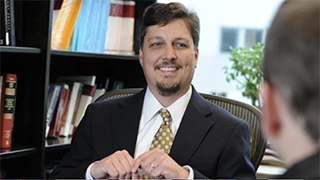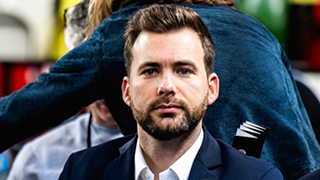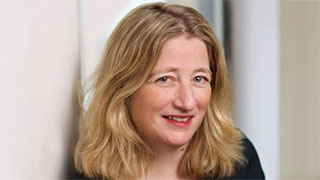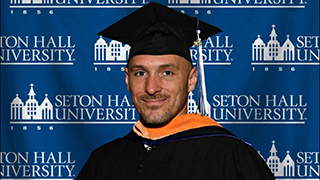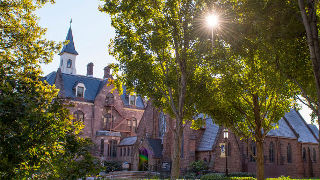United Nations Field Seminar Hosts U.S.-Pakistan Intercultural Coalition (UPIC) Delegates
Tuesday, May 13, 2025
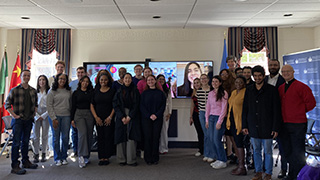 On March 21, students from the School of Diplomacy’s United Nations Field Seminar had an opportunity to engage in a case study on implementing
the United Nations’s Sustainability Development Goals in high-conflict zones. Adopted
by the United Nations in 2015, the 17 SDGs aim to achieve a more just and sustainable
world by 2030.
On March 21, students from the School of Diplomacy’s United Nations Field Seminar had an opportunity to engage in a case study on implementing
the United Nations’s Sustainability Development Goals in high-conflict zones. Adopted
by the United Nations in 2015, the 17 SDGs aim to achieve a more just and sustainable
world by 2030.
Leading the exercise were representatives from the U.S.-Pakistan Intercultural Coalition (UPIC), including its founder, Reverend Bob Chase and Executive Director, Anjum Malik.
Founded in 2011, UPIC is a civil society organization that aims to build constructive dialogue and peaceful relationships among civil society groups in the U.S. and Pakistan. The United Nations Field Seminar (DIPL 4205/6205) is taught by Reverend Brian Muzás, assistant professor and director of the Center for UN and Global Governance Studies at the School of Diplomacy. Each week, graduate students meet with United Nations representatives who are engaged in advancing the SDGs and then work on policy writing.
At the seminar, Malik discussed four of the sustainability development goals that UPIC focuses on: achieving gender equality; reducing inequalities; promoting peace, justice and strong institutions; and fostering global partnerships. Since its establishment, UPIC has conducted frequent cultural exchange missions, interpersonal engagements and academic partnerships related to the implementation of the SDGs. Reverend Chase shared stories of change from both the perception of the U.S. and Pakistan, especially during turbulent political times. Chase’s speech reflected UPIC’s longstanding commitment to building bridges between the two countries. He noted that “UPIC has three primary objectives: to build interpersonal relationships; to shatter stereotypes, both in the U.S. and Pakistan; to build an action agenda together that enhances mutual understanding and the quality of life in both countries.”
One of the highlights of the session was an interview-style exchange between Malik and Reverend Chase, which allowed students to better understand the role of intercultural cooperation in diplomacy. Malik asked about the effective starting points for the implementation of a project and the definition of interfaith and intercultural differences. Reverend Chase’s response was that: “It begins with people and involvement.” Reverend Chase noted the importance of representation, and having a broad spectrum of cultural and religious groups represented and actively participating in the process. He explained that UPIC had a collaborative delegation from all around the region, including a diverse delegation, bringing together cultures and voices from Abrahamic traditions — Muslims, Jews and Christians — as well as Buddhists, Hindus and others. UPIC prioritizes field cooperation, traveling to local communities to understand the realities on the ground.
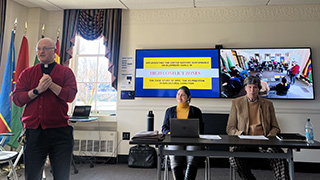 A key theme throughout the lecture was multiplicity of identity. Malik’s presentation
demonstrated the importance of sociocultural differences and how they affect cultural
relationships. Malik and Reverend Chase also discussed differences among high-conflict
zones. Their field experience in Pakistan revealed how repeated, unstable conditions
and ethnocentric interactions among disparate social groups can be a significant challenge,
especially where bias and mistrust exist. They pointed to the need for self-awareness,
situational and cultural awareness and empathy in high-conflict zones.
A key theme throughout the lecture was multiplicity of identity. Malik’s presentation
demonstrated the importance of sociocultural differences and how they affect cultural
relationships. Malik and Reverend Chase also discussed differences among high-conflict
zones. Their field experience in Pakistan revealed how repeated, unstable conditions
and ethnocentric interactions among disparate social groups can be a significant challenge,
especially where bias and mistrust exist. They pointed to the need for self-awareness,
situational and cultural awareness and empathy in high-conflict zones.
The in-person and web-based course was co-hosted by PinkDetect Inc. co-founders Suha Suleman Lalani and Solmaz Ebrahimi-Iranpour. PinkDetect Inc. is Pakistan’s first breast health management app. The seminar concluded with a policy implementation workshop between PinkDetect Inc. co-founders, UPIC delegates and Seton Hall students.
The lecture was a powerful reminder of conflict resolution and SDG alignment, especially in high-conflict zones. Over the semester, the UN-Field Seminar course hosted many professionals from international organizations and the civil society. By bringing diverse voices to the course and fostering relationships between cultures, the UPIC session offered not just insights, but a model for building bridges between conflicted international relations and high-conflict zones.
Reverend Bob Chase
Reverend Chase is an ordained minister in the United Church of Christ and Fellow of
the Center for United Nations and Global Governance Studies with the School of Diplomacy.
He founded Intersections International in 2007, an interfaith initiative of the Collegiate
Church of New York intended to unite people across lines of difference. He also co-founded
the US-Pakistan Intercultural Coalition (UPIC) in 2011 along with the late Mumtaz
Ahmad of Pakistan. UPIC operates at a grassroots level to increase mutual understanding
between the U.S. and Pakistan.
Anjum Malik
Anjum Malik is a social sciences practitioner with a background in archaeology and
sustainable cultural heritage. She brings 7+ years of experience leading strategy,
implementation, enhancement and management of social impact projects with a focus
on community-driven and sustainable solutions. She has held leadership positions at
the Higher Education Commission (HEC) and the Rural Support Programmes Network (RSPN)
in Pakistan. She currently serves as the Executive Director of UPIC, and is a consultant
for strategic communications and partnerships at PinkDetect Inc..
Categories: Nation and World

